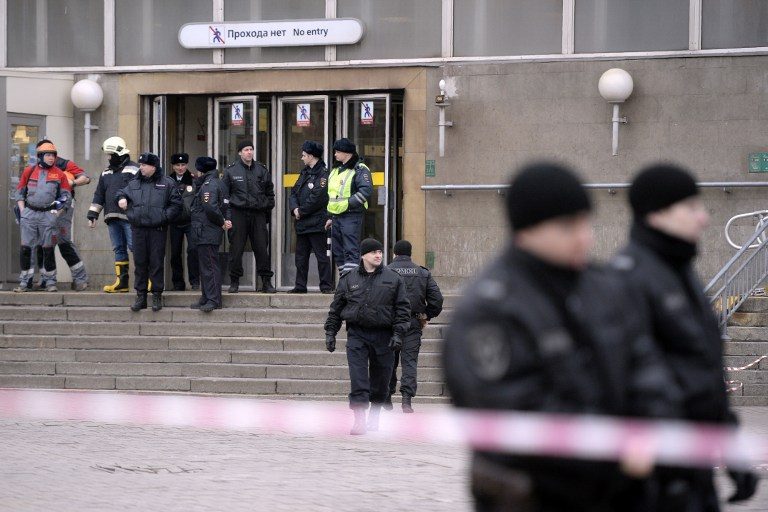SUMMARY
This is AI generated summarization, which may have errors. For context, always refer to the full article.

SAINT PETERSBURG, Russia – Russian investigators on Thursday, April 6, raided acquaintances of the suspected Saint Petersburg metro bomber, as the country held commemorative rallies to honor the 13 victims.
Authorities said searches targeted the flat of “several citizens of Central Asian republics, who had been in contact” with 22-year-old Akbarjon Djalilov, thought to be a Russian national born in Central Asian Kyrgyzstan.
“Objects relevant to the investigation were found during the search of the apartment where these people lived,” said the powerful Investigative Committee.
“They were all confiscated and sent for analysis.”
As the probe into the bombing gained pace thousands of people gathered at officially sanctioned rallies in Moscow and Saint Petersburg to remember the victims.
People clutching flowers and white balloons gathered at a rally outside Saint Petersburg’s Technological Institute metro station, one of the two stations at the heart of the attack.
“I came to show that we will not be frightened,” 48-year-old Valentina Zlobina told AFP. “We will become even more united in this tragedy.”
In Moscow singers serenaded a crowd of several thousand next to the walls of the Kremlin at a meeting carried live on state TV that included public transport workers and prominent pro-Kremlin lawmakers.
No claim
No one has yet claimed responsibility for the blast that tore through a subway carriage in Russia’s second city on Monday.
Djalilov’s remains were found at the blast site and traces of his DNA were also discovered on a bag containing a bomb at another metro station that was successfully defused, investigators said.
Investigative Committee chief Alexander Bastrykin has ordered officials to look into any potential “links” between the alleged attacker and the Islamic State (ISIS) group.
ISIS members – including foreign fighters from the ex-Soviet Central Asia and the Caucasus region – have repeatedly threatened an attack on Russian soil to avenge Moscow’s military backing of Syrian leader Bashar al-Assad.
And in a sign of a city on edge, the FSB security service told TASS news agency it had found and defused a “homemade explosive device” during a search in a Saint Petersburg apartment building.
The authorities have not linked the discovery to Monday’s bombing.
While the wait went on for any claims of responsibility for Saint Petersburg, ISIS on Thursday said it was behind a separate attack that killed two Russian traffic police in the southern city of Astrakhan this week.
The claim came after security agencies said they had killed four suspects behind the slaying in the city close to the volatile North Caucasus region.
First funeral
At a cemetery outside Saint Petersburg, distraught relatives and friends held the first funeral for one of the victims of the attack.
Around 50 people carrying flowers and weeping gathered in a village on the city’s outskirts for the funeral of 50-year-old dollmaker Irina Medyantseva who was on the metro with her daughter Yelena, now recovering in hospital.
“We had just bought a flat near here in a beautiful building, our daughters were doing well, and then this happened,” husband Alexander Kaminsky told AFP.
“You can’t process what happened in your mind,” said colleague Svetlana Koroleva. “Only a monster could kill innocent people.”
The attack has shaken the authorities and rattled Saint Petersburg just two months before it hosts the opening game of the Confederations Cup football tournament, a curtain raiser for the 2018 World Cup in the country.
Russia suffered a wave of brutal attacks in the 1990s and 2000s blamed mainly on a rebellion in Chechnya that morphed from a separatist uprising into an Islamist insurgency.
The country’s transport network – including the metro in Moscow – was hit repeatedly by suicide bombers leaving scores dead.
But there had been no attacks against a major city since blasts in the southern city of Volgograd in December 2013, weeks ahead of the Sochi Winter Olympic Games.
IS, however, has struck at Russia abroad, claiming a bomb attack in October 2015 that blew a passenger jet packed with holidaymakers returning to Saint Petersburg out of the air over Egypt, killing all 224 people onboard.
In an apparently unrelated event an explosive device injured a homeless man in the southern city of Rostov-on-Don. – Rappler.com
Add a comment
How does this make you feel?
There are no comments yet. Add your comment to start the conversation.